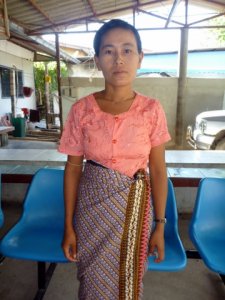Burma Women’s Medical Fund
Since its foundation, BCMF has expanded beyond the treatment of children in recognition of the need for specialised medical care for adults. While the majority of our patients are children, we have two additional auxiliary programs, the Burma Adult Medical Fund (BAMF) and the Burma Women Medical Fund (BWMF).
Previously, BCMF focused on treating children, often the most vulnerable members of society and the ones who have the most living to do. However, over the years we have expanded our scope to include women with gynecological conditions that leave them severely debilitated. Women are integral to the survival and flourishing of their communities; their medical care has benefits that extend far beyond the women themselves.
Gynecological conditions are not always seen as serious because they are often not life-threatening; however they severely impact patients’ quality of life. BWMF aims to fund the surgical and support costs involved in common gynaecological conditions such as uterine prolapse, ovarian cysts, and uterine
myoma (fibroids).
- Ovarian cysts can be painful and can grow quiet large, and can in fact be cancerous
- Uterine masses are most commonly fibroids (benign tumors) which may be associated with pain and excessive menstrual blood loss. Since anemia is common in this population anyway, due to nutritional factors and parasites, this places an additional burden on the women
- Uterine prolapse is a distressing condition in which one’s insides feel like they are falling out. This is particularly the case with exertion, and exertion is an inescapable fact of life for many women inside Burma and living on the border. With advanced prolapse, the cervix and uterus protrude from the vagina. This is particularly distressing and readily resolved with hysterectomy
Damage to the birth canal during labor, caused mainly during home births in Burma, is another common condition seen by the clinic. Included in this are vaginal fistulas and rectal-vaginal fistulas. Most of these are open communications between the bladder and vagina giving a steady leak of urine from the vagina, leaving the woman susceptible to chronic and severe urinary tract infection. Even more distressing is a fistula between the rectum and vagina resulting in faeces from the vagina. Both of these are related to prolonged obstructed labor and thus mostly occur in young women.
The majority of BWMF patients can undergo surgery at a relatively low cost at the local Thai hospital in Mae Sot. BCMF works closely with Mae Tao’s Reproductive Health Department to manage this program. Because the majority of BWMF patients can undergo surgery at Mae Sot Hospital, costs are usually lower and as a result, more patients can be treated.
Women in Burma face ongoing human rights violations and their lack of access to healthcare is a direct violation of their right to health. This is a well-documented truth. For example, a Back Pack Health Worker Team (BPHWT) report shows a direct correlation between human rights abuses in eastern Burma, and reproductive health outcomes, and shows that these abuses are directly related to the “downstream effects of war and poverty.” The debilitating gynaecological conditions women on the Thai-Burma border suffer from are directly linked to poverty and lack of access to resources. By addressing the healthcare needs of women on the Thai-Burma border we aim to restore dignity, as well as begin to redress the impact of these numerous rights violations.




